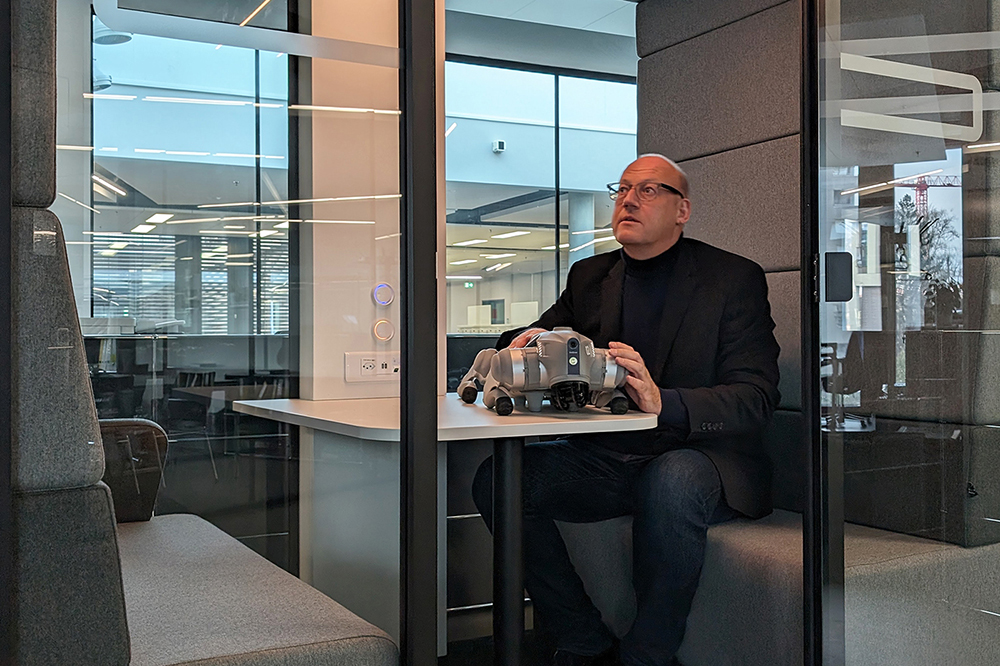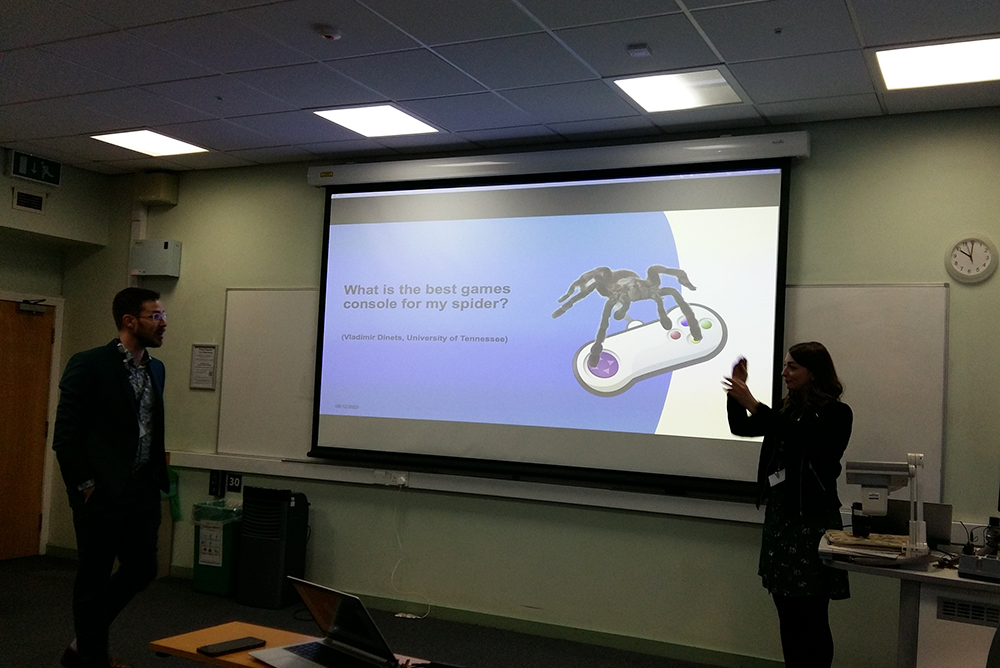Prof. Dr. Oliver Bendel’s privately funded Social Robots Lab (SRL) has been home to the Unitree Go2 since December 2023. It goes by the name Bao (Chinese for “jewel” or “treasure”). Heise writes in an article: “The basic model of the Go2 is equipped with a lidar on the head, which has a hemispherical field of view of 90 degrees vertically and 360 degrees horizontally. The minimum range of the lidar is around 5 cm. This enables the robot to navigate independently in the terrain, recognize obstacles and also avoid them. The robot runs at a speed of up to 2.5 m/s and is extremely agile. … A 2-megapixel camera is also on board, which can be used to take snapshots and videos.” (Heise News, July 27, 2023; own translation) The information systems specialist and technology philosopher is keen to make progress in the field of animal-machine interaction. He defined this field of work in 2013 in his article “Considerations about the Relationship between Animal and Machine Ethics“, based on the concept of animal-computer interaction pioneered by Clara Mancini. Since then, he has developed several artifacts and concepts in this area, including Robocar (modeling for animal-friendly cars), LADYBIRD (prototype of an insect-friendly vacuum cleaner robot), HAPPY HEDGEHOG (prototype of a hedgehog-friendly vacuum cleaner robot), and ANIFACE (concept for a system with facial recognition to identify brown bears). Bao will be used to test the reactions of domestic, farm, and wild animals. The aim is to make robots not only human-friendly, but also animal-friendly (Photo: Frank Graef).
Artificial Intelligence & Animals
The online event “Artificial Intelligence & Animals” will take place on 16 September 2023. “AI experts and attorneys will discuss the intersection of AI and animals in this UIA Animal Law Commission and GW Animal Law webinar” (Website Eventbrite) Speakers are Prof. Dr. Oliver Bendel (FHNW University of Applied Sciences and Arts Northwestern Switzerland), Yip Fai Tse (University Center for Human Values, Center for Information Technology Policy, Princeton University), and Sam Tucker (CEO VegCatalyst, AI-Powered Marketing, Melbourne). Panelists are Ian McDougall (Executive Vice President and General Counsel, LexisNexis London), Jamie McLaughlin (Animal Law Commission Vice President, UIA), and Joan Schaffner (Associate Professor of Law, George Washington University). Oliver Bendel “has been thinking on animal ethics since the 1980s and on information and machine ethics since the 1990s”. “Since 2012, he has been systematically researching machine ethics, combining it with animal ethics and animal welfare. With his changing teams, he develops animal-friendly robots and AI systems.” (Website Eventbrite)
Minding Animals 2024
After an hiatus of six years, Minding Animals will return, with a conference tentatively scheduled to be held 11 – 17 July, 2024. This was announced by the organizers in a message dated December 19, 2022. “Just like the postponed 2021 conference, Minding Animals 5 (MAC5) will be hosted by the Centre for Compassionate Conservation (CfCC) in the Transdisciplinary School at the University of Technology, Sydney (UTS).” (Message from Minding Animals International) The organizers refer to the Minding Animals Bulletin 53 regarding the vision of the conference and the preparation of the authors. “We believe that the greatest threat posed to the planet, to all planetary life, human or nonhuman animal, plant or otherwise, including the current pandemic, is the intersection of animal agriculture and the climate crisis. Hence, the urgency and criticality of climate as the key theme.” (Minding Animals Bulletin 53) Possible subtopics include “The biodiversity crisis and climate change”, “Rewilding and compassionate conservation”, “The animal industrial complex”, “Animals, the circular economy and sustainable food systems”, and “Animals in development and food sovereignty”.
Face Recognition for Bears in the Alps
At the end of the ACI conference, the “Paper Session 6” was held, which was titled “Investigating Human-Animal Relations”. Sarah Webber (University of Melbourne) gave a talk on “Watching Animal-Computer Interaction: Effects on Perceptions of Animal Intellect”. In the experiment, people observed orangutans interacting with computer applications. It was examined how they changed their judgments regarding the animals’ intelligence and behavior. The talk that followed came from Alexandra Morgan (Northumbria University) and was titled “Blind dogs need guides too: towards technological support for blind dog caregiving”. She addressed the needs of blind dogs and showed what gadgets are on the market to assist them. Her team developed an app called “My Blind Dogo” that could help owners of blind dogs. The session ended with a talk on “A Face Recognition System for Bears: Protection for Animals and Humans in the Alps” by Oliver Bendel (University of Applied Sciences and Arts Northwestern Switzerland). He presented an integrated system with cameras, robots, and drones that Ali Yürekkirmaz and he had designed. The ACI took place from 5 to 8 December 2022 in Newcastle upon Tyne. It is the world’s leading conference on animal-computer interaction. More information on the conference via www.aciconf.org/aci2022.
Wearables for Sled Dogs
On the last day of the ACI Conference (December 8, 2022), “Session 5: Sensors & Signals, Part II: Electric Boogaloo” started after the lunch break. Carlos Alberto Aguilar-Lazcano (CICESE-UT3) gave a talk on the topic “Towards a monitoring and emergency alarm system activated by the barking of assistant dogs”. The next presentation was “WAG’D: Towards a Wearable Activity and Gait Detection Monitor for Sled Dogs” by Arianna Mastali (Georgia Institute of Technology). According to her, studies have shown orthopedic injuries to be most common among sled dogs. These like to move very much, but repeatedly exceed their capabilities. To solve this problem, the team has developed a technical solution, a special wearable, with the help of which data on the condition of the animals are generated. “Spatial and Temporal Analytic Pipeline for Evaluation of Potential Guide Dogs Using Location and Behavior Data” was the title of the next talk, given by David L. Roberts (North Carolina State University), followed by “Comparing Accelerometry and Computer Vision Sensing Modalities for High-Resolution Canine Tail Wagging Interpretation”, given by Devon Martin (North Carolina State University). More information on the conference via www.aciconf.org/aci2022.
Talking Eggs
After the keynote on the morning of December 8, 2022, ACI2020 continued with “Paper Session 4: Sensors & Signals, Part I: Origin Stories”. David L. Roberts (North Carolina State University) presented on “Motion-Resilient ECG Signal Reconstruction from a Wearable IMU through Attention Mechanism and Contrastive Learning”. The next talk, “TamagoPhone: A framework for augmenting artificial incubators to enable vocal interaction between bird parents and eggs”, was given by Rebecca Kleinberger (Massachusetts Institute of Technology & Northeastern University). The starting point of her research was that some birds have pre-hatching vocal communication. The last presentation before the lunch break that was given online was “Simultaneous Contact-Free Physiological Sensing of Human Heart Rate and Canine Breathing Rate for Animal Assisted Interactions: Experimental and Analytical Approaches” by Timothy Holder and Mushfiqur Rahman (North Carolina State University). More information on the conference via www.aciconf.org/aci2022.
Time Savers or Toys?
The fourth day of the ACI2022 conference – December 8, 2022 – began with a keynote by Carys L. Williams (DogsTrust), titled “Time Savers or Toys? Realities of Animal Technology in Industry”. “Carys is a mixed-methods Research Officer at the UK’s largest dog welfare charity, Dogs Trust. Carys’ work has focused on practical and applicable dog behaviour and welfare research to improve the lives of dogs, especially those in Dogs Trust’s 22 rehoming centres (around 12,000 dogs a year!). For the last 2 years Carys has been project lead for the Dogs Trust Post Adoption Support longitudinal research project. She has additionally supported the charity’s move to collect more and better dog data, helping build exciting bespoke digital systems. Carys has also spent over a decade in the zoo industry and is currently a volunteer invertebrate keeper at ZSL London Zoo.” (Website ACI2022) Carys L. Williams started her keynote with a quote from Vladimir Dinets (University of Tennessee): “What is the best games console for my spider?” … She then turned to real-world issues, such as supporting the welfare of dogs through technological means. More information on the conference via www.aciconf.org/aci2022.
About Parrots and Dogs
The ACI2022 conference continued on the afternoon of December 7, 2022 after the coffee break (“Paper Session 3: Learning From and With Each Other”). Cristóbal Sepulveda Álvarez (Universidad de Chile) gave a talk on the topic “Measuring Digitally Comparative Abilities Between Discreet and Continuous Quantities through a Digital Enrichment Application”. He showed a parrot that had to choose different quantities on a touch screen. Dirk van der Linden (Northumbria University) was present on behalf of Jasmine Forester-Owen (Northumbria University). He spoke about “Noisy technology, anxious dogs: can technology support caregiving in the home?”. In their prototype, they combine noise detection and body language identification in dogs. Jérémy Barbay (Universidad de Chile) gave the last three presentations of the day: “Comparing Symbolic and Numerical Counting Times between Humans and Non-Humans Through a Digital Life Enrichment Application”, “Popping Up Balloons for Science: a Research Proposal”, and “A Loggable Aid to Speech (for Human and Non-Human Animals): A Research Proposal”. More information on the conference via www.aciconf.org.
Towards Exploring Perceptions of Dogs
The ACI2022 conference continued on the afternoon of December 7, 2022. “Paper Session 2: Recognising Animals & Animal Behaviour” began with a presentation by Anna Zamansky (University of Haifa). The title was “How Can Technology Support Dog Shelters in Behavioral Assessment: an Exploratory Study”. Her next talk was also about dogs: “Do AI Models ‘Like’ Black Dogs? Towards Exploring Perceptions of Dogs with Vision-Language Models”. She went into detail about OpenAI’s CLIP model, among other things. CLIP is a neural network which learns visual concepts from natural language supervision. She raised the question: “How can we use CLIP to investigate adoptability?” Hugo Jair Escalante (INAOE) then gave a presentation on the topic “Dog emotion recognition from images in the wild: DEBIw dataset and first results”. Emotion recognition using face recognition is still in its infancy with respect to animals, but impressive progress is already being made. The last presentation in the afternoon before the coffee break was “Detecting Canine Mastication: A Wearable Approach” by Charles Ramey (Georgia Institute of Technology). He raised the question: “Can automatic chewing detection measure how detection canines are coping with stress?”. More information on the conference via www.aciconf.org.
About Animal-centered Design
ACI2022 continued on December 7 with Paper Sessions. Number 1 was “Designing for Human-Animal Relations”. Clara Mancini from The Open University gave a talk on the topic “Politicising Animal-Computer Interaction: an Approach to Political Engagement with Animal-Centred Design”. She is one of the pioneers in the discipline of animal-computer interaction. This was followed by Dirk van der Linden’s presentation “Animal-centered design needs dignity: a critical essay on ACI’s core concept”. The scientist from the Northumbria University referred to the Swiss law, which assumes the dignity of living beings – animals as well as plants, it should be added. Minori Tsuji from Future University Hakodate spoke about the “Investigation on Enhancement of the Sense of Life in Safari Park Online Tours with Animal Breathing Reproduction System”. Visitors can touch artifacts with different breathing frequencies. The final contribution in the morning came from Jennifer Cunha (Parrot Kindergarten) and Corinne Renguette (Indiana University-Purdue University). It was about “A Framework for Training Animals to Use Touchscreen Devices for Discrimination Tasks”. The scientists taught various animals, such as a parrot, a rat and a dog, how to use tablets. More information on the conference via www.aciconf.org.









